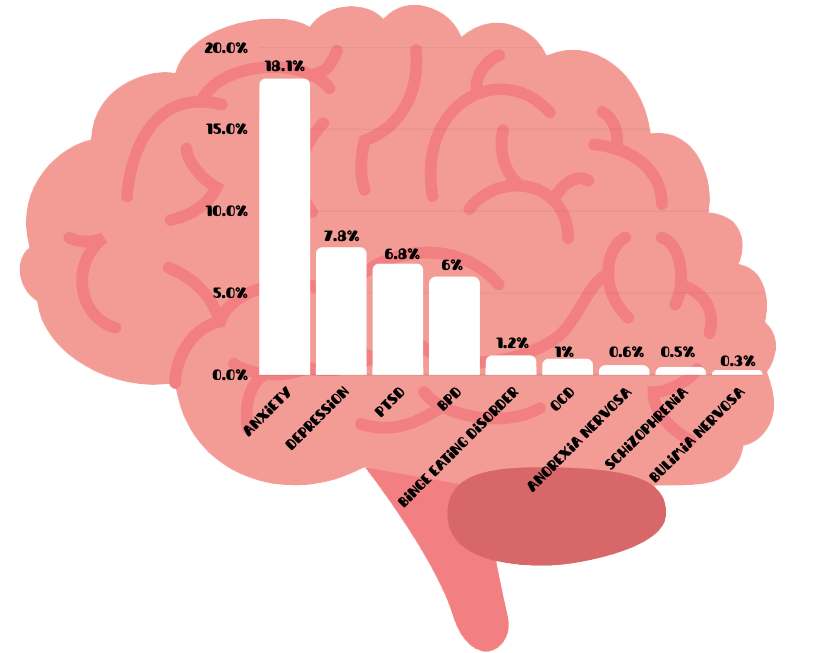Money Talks
May 21, 2022
Mental health is a factor in almost everyone’s lives. Whether it’s someone struggling with their own issues, or someone else who is a part of their life. These health problems don’t have quick fixes, and on the contrary can require great lengths of help from people who are able to walk you through recovery.
Unfortunately this type of help isn’t always affordable for everyone who needs it. More often than not, therapy costs override the need for mental guidance. Even if you know that you need help and are willing to receive it, the high price of a well-trained therapist can cease that opportunity.
Cognitive behavioral therapy is one of the most common types of therapy for mental health disorders such as depression, anxiety, eating disorders and substance abuse. In this type of session the therapist will talk their patient through the issues they are experiencing and offer possible coping skills. They will introduce changes in both thinking and behavioral patterns. In most cases a session of this form of therapy is expected to cost from $100 to $200.
Ashleigh Clayton, junior at Lincoln Southeast Highschool, has had her own struggles with finding affordable therapy. She has also found it difficult to find a therapist who helps her in the way that she needs.
“We went to several different therapists and they were too expensive,” Clayton (11) said. “I only actually ever went to one therapist, but we definitely were not wanting to go there for a while because they were so expensive.”
Finding therapy within a reasonable price range does not only have to do with the type of therapist being paid for, but the location of the therapist as well. Depending on where the patient or the therapist lives the price may be higher due to the state of the economy.
The specialization of the therapist can also unfortunately harm the affordability of a session. Depending on the education needed for each disorder specialization, the price could be raised based on training. This will also affect the amount of time spent per session, or amount of sessions. The longer the therapy session, the more the patient can expect to pay.
“With the therapist I know it was like, a couple hundred dollars every time. I just talked to her for like, 20 minutes,” Clayton said.
Luckily for some, insurance can help reduce the cost. Due to The Patient Protection and Affordable Care Act (PPACA), insurance has been made helpful in affording the expenses following a therapy session.
Passed in 2014, also known as “Obamacare,” this act was meant to make healthcare more affordable and accessible to Americans without it. This also stretched out to mental health patients. Not only were adults with mental health struggles being helped, but there was also an extension to young adults.
Some states have decided to remove themselves from being under the law’s expansion of Medicaid, leaving those who live in said states a lack of health coverage.
Continued coverage is not guaranteed for everyone. Some forms of mental illness need further help than a therapy session. When clients are sent to in-patient treatment, they are kept in a hospital or medical center in order to get extended and more detailed help than in an average therapy session.
Hospitalization and residential treatment are the two types of inpatient treatment. When someone is hospitalized, it usually occurs after a mental health crisis, leading the patient to need medical care. The patient will usually stay either overnight or a series of nights to rehabilitate. They then leave with options of out-patient therapy given by doctors at the hospital. Before any form of insurance, a typical overnight stay can cost between $6,000 and $9,000.
Insurance doesn’t always help in these high-priced instances. Inadequate provider networks can cause patients to lose the chance of a valid price and the immediate help they may need. Insurers need a prominent amount of in-network workers in order to cover a certain necessity.
For example, mental health doesn’t always fall under this category. In certain places around the country, there aren’t an “adequate” amount of mental health care professionals in order to put it under insurance coverage. This not only retains the large expense, but creates a new problem in which the client has to find help outside of their location.
Insurance companies also usually have requirements on the type and level of illness that the patient is facing. This often leaves patients who don’t fit the “criteria” of depression, anxiety, or substance abuse without a way to pay for the help they need. This is also why many people with mental illness do not believe their struggles are severe enough to even need the help they deserve.
Because of this, patients often do not get the proper help that they need. It can be very difficult for people to find a therapist who can help them and their individual struggles. Whether it’s experience, training, or location, a good therapist can be hard to find.
“It’s (hard) trying to find someone that works,” Clayton said. “Like, someone who actually can help.”
This issue has affected people struggling with mental illness for years. There are a few possible solutions that don’t involve insurance or an extensive cost, though they may be difficult to find.
Some are given the opportunity of a private pay depending on the therapist. This means that the patient will be paying directly through the therapy organization per session. This gives the client the ability to continue therapy sessions at a steady price. It also allows them to stay with the same therapist rather than having to find a new one who takes their insurance.
“For clients without insurance, we do what’s called a private pay rate which is just saying, ‘okay you’re not using insurance, here’s the fixed rate that you are gonna pay per session,’’’ Leslie Walker, therapist at Hope Healthcare said. “We try to make that pretty comprable to what someone would be left with if they had an insurance plan.”
This type of payment may still be too high of a price for many to pay. Community counseling centers may be the best option in this scenario. Universities often have students who are well enough into their training program to give a form of therapy to people struggling with mental illness who still cannot pay the expenses of a professional therapist. In most universities your tuition could also pay for any counseling covering crisis, eating disorder treatment, substance abuse, and informal consultations.
“When I was in grad school we had a counseling clinic where we charged ten dollars,” Walker said. “It’s students doing the counseling, but we’re far enough in our program that it’s better than nothing. There are places like that around as well that will do essentially free counseling.”
There are many issues that occur when someone is trying to find counseling or therapy. It can be hard for some to even get out of bed in the morning due to their depressive state, which could make the idea of having to pay an expensive price for the therapy that they need feel much too distant.
Therapy has been made a luxury rather than a necessity. This financial burden should not be put on anyone. There are a few ways around this, though they may be a bit more difficult to find, that can hopefully help someone be put on the road to recovery.


















